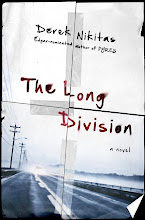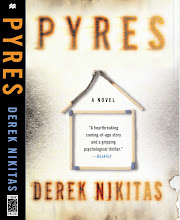For me, a top movie from last year was Cronenberg's A History of Violence. Loved the clash between rural (almost pastoral) atmosphere and mobster violence. Great premise: small town diner owner defends himself against armed robbers and inadvertantly reveals a sordid past that bears no relation to his present-day life. And then that past comes to claim him.
Core of the movie is the relationship between the husband and wife and how it's tested by these revelations about his past. Yes, the violence is kick ass and shocking, though Tom/Joey tends to be more of a superhero than seems believable.
But the scenes that hit truth are those between husband Tom and wife Edie. Especially a sex scene on the stairs that starkly reveals how powerful and non-gratuitous sex scenes can be. Two minutes of coitus covers every theme in the story. And the very last scene at the dinner table, the last two shots of husband and wife meeting eyes with each other--just great cinema. No dialouge necessary, like in the stair-sex scene. In fact, one of the few flaws in the film is the rather wooden dialogue that seems culled from the rustiest bits of Andy Griffith and the The Sopranos. What makes this movie brilliant is that it could well be a silent film.
Knew since I saw it--maybe before--that it was based on a graphic novel of the same name. Liked the film, but only found the novel this afternoon at the bookstore. Skimmed through it and noticed quite a few images I never saw in the film. So, what the heck. Bought it, read it this evening in one sitting.
Meh. Certainly a lot more story, but all the changes the filmmakers made were good ones. I didn't need all the mobster backstory I got in the novel. Not to mention: the novel's backstory paints "Joey" as a kind of good-guy vigilante out to get surgery money for his dear old grandma. He's a hero all along. The film Tom/Joey fascination is the mysterious killer that lurks inside of him, this past that's all the more sinister because we know so little about him.
In the movie, he's actually related to the big mobster, which raises the issue of past family versus present family. In the book, he's got to go back home to rescue an old friend. I admit, the final showdown and the fate of Joey's friend Richie is far more inventive and compelling than the climax of the movie version, but it's the silent dinner scene at the end that makes up for all that.
In the book, Tom/Joey's last words to his wife are "it's over." Meaning, the violence. But that's not at all the case in the movie, and the movie speaks the emotional truth. It's not over, and it never will be. The physical threat might be gone, but this family is changed irrevocably and forever.
The book version provides very little depth and complexity of characterization for any of the characters. Mucho backstory, but backstory is not character. Character is the handling of dramatic conflicts in the present tense of the story. In the book, Joey is generally a powerhouse who shows a little resistance to his past but not much ambivalence about it. Once it's out in the open, he's cool with it.
Worse, Edie is cool with it and even goes with him to New York (Philly in the movie) to do some shopping while he kills mobsters. Granted, she doens't know he's off to kill mobsters. The book Edie cares about his well-being, but she's not beautifully conflicted the way Maria Bello's character is. In the book, she doesn't ask "was I available" or "what about our name?"
In the book, the son gets almost no characterization. In the movie, his high school bully showdown scenes are somewhat contrived, but he becomes a much more important part of the family conflict and the threat of violence being passed on generationally.
My point? I don't know. Movie's better than the book, which is a rarity. Course, we much take into account that the book is a graphic novel. One might argue that graphic novels are more like movies than they are like novels, at least some. But what strikes me is how what's left out in the movie is what enhances it. Cut backstory, cut dialogue. The novel's got more clever set pieces and situations, but all this can't beat complex and morally conflicted character. That's what truly compels.
Also: prevailing wisdom says novels are better because of the depth of explanation and detail, the inner monologue. But sometimes--sometimes--the silent gesture and expressions of a great actor can say more, and speak more deeply, than a few paragraphs of plodding prose. Least in this case.



2 comments:
Graphic novels are something of an infant form, sorta like Victorian 'sensation' novels.
Like Dickens and Collins, a lot of graphic novels first appeared as serials. And like a fair few of those Victorian novels, they sometimes suffer from Meandering Plot Syndrome.
Unlike those early novels, graphic novels also sometimes suffer from Artist vs. Writer Syndrome.
I thought 'History' the book suffered from both of these. The movie, neither.
You're totally right, the movie had a streamlined script free of deadweight and a director who knew when to let the pictures tell the story.
Like your new solo blog, by the way!
Thanks, Steve. I agree there's a lot of hit or miss with graphic novels, though the same can probably be said for poetry, which has been around for a couple more years. Good analogy with the Victorian serialists. Nobody reads "Varney the Vampire" anymore, but uber-serialist Dickens still reigns. Fun Home won a shitload of awards last year, so the heroes are out there. Graphic Novels will have their day, I think.
Post a Comment